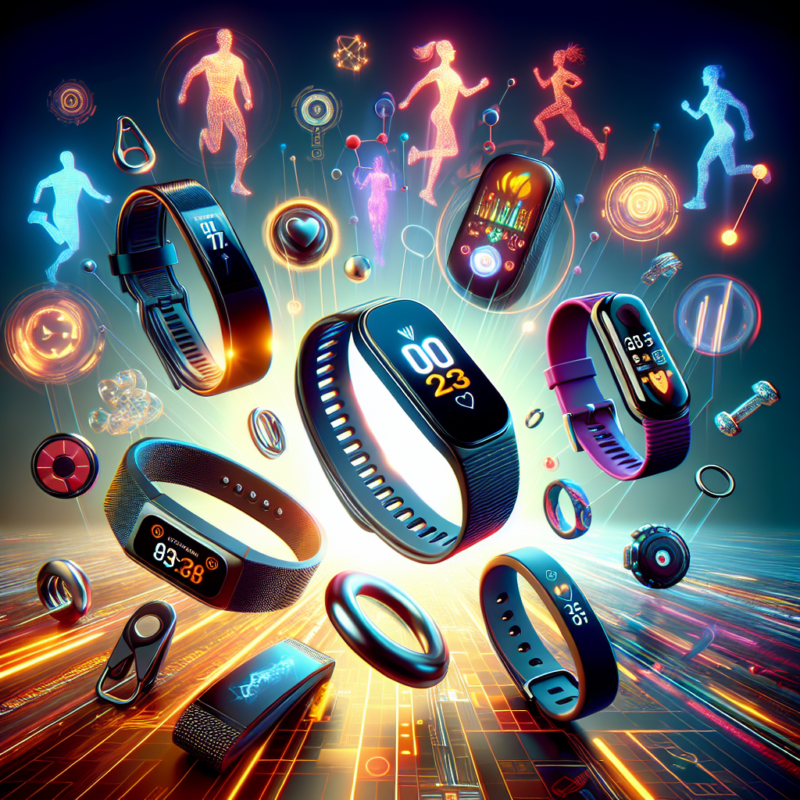A Guide to Selecting the Perfect Fitness Tracker for Your Workout Goals

Finding the right fitness tracker can significantly impact your workout experience and help you stay motivated. With so many options available, selecting the best fitness tracker tailored to your workout goals can be overwhelming. In this comprehensive guide, we will outline key factors and features to consider when choosing a fitness tracker that fits your lifestyle and fitness aspirations. Whether you’re looking to monitor heart rate, track steps, or set specific fitness goals, we’ll help you navigate through the options available to find the perfect match for your needs.
Understanding Fitness Trackers: What They Can Offer
Fitness trackers come in various shapes and sizes, each designed with distinct functionalities aimed at enhancing your workout experience. These devices provide a plethora of features such as heart rate monitoring, calorie counting, sleep tracking, and GPS capabilities, all of which can significantly aid in achieving your fitness goals. By continuously tracking your physical activities, these gadgets help you maintain a level of accountability and motivation that is often necessary for constant improvement.
The core purpose of a fitness tracker is to help you monitor your physical activities and health metrics in real-time. Many models also come with smartphone compatibility, allowing you to access apps that offer deeper insights into your performance. By understanding how your body responds to different levels of activity, you can adjust your workouts more effectively, enhance your efforts, and focus on specific fitness outcomes, such as weight loss, muscle building, or improved cardiovascular health.
Identifying Your Fitness Goals
Before diving into the technical features of fitness trackers, it’s crucial to assess your personal fitness goals. Are you looking to lose weight, build muscle, increase endurance, or perhaps maintain a healthy lifestyle? Identifying these goals will significantly narrow down your choices and guide you toward the specific features you’ll need in a tracker. For instance, if weight loss is your primary focus, a tracker with precise calorie counting and step-tracking capabilities would be beneficial.
Conversely, if your aim is to boost your athletic performance, you may require a fitness tracker with advanced metrics such as VO2 max estimations, advanced heart rate analytics, or interval training modes. By determining your primary objectives, you’ll not only save time but also ensure that you choose a device that aligns with your unique needs, ultimately leading to better results in the long term.
Key Features to Consider in a Fitness Tracker
Heart Rate Monitoring
One of the primary features to look for in a fitness tracker is heart rate monitoring. Continuous heart rate tracking provides valuable insights into your cardiovascular health and can be an excellent way to gauge workout intensity. High-end models often offer advanced heart rate variability (HRV) monitoring, which can be useful for understanding stress levels and recovery metrics.
Moreover, having a fitness tracker with an accurate heart rate monitor means you can adjust your workouts more effectively, ensuring you’re exercising within your optimal heart rate zones. This not only boosts performance but also keeps your workouts safe. When choosing a tracker, look for one that utilizes advanced sensor technology for the most accurate readings.
Battery Life
Battery life is another critical factor when selecting a fitness tracker. Depending on your workout frequency and daily usage, a tracker with a short battery span may require frequent charging, which can interfere with your fitness routine. Devices with higher-end technological features, like GPS functionality, often consume more power; hence it’s crucial to evaluate how often you will be using these advanced features.
Check the manufacturer’s specifications for battery life, and consider how long the device can run under different modes. Some fitness trackers offer longer battery life when used in basic mode compared to when all advanced features are activated, providing flexibility based on your needs. It’s often worth investing in a device that can go for several days or even weeks without needing to be charged.
Integration with Apps and Other Devices
Compatibility is another important consideration in your search for the best fitness tracker. Most fitness trackers communicate with companion apps that allow you to analyze your health data more intricately. When choosing a fitness tracker, evaluate the app’s user interface, data presentation, and the availability of features such as goal setting, progress tracking, and virtual coaching.
Furthermore, consider whether the tracker can integrate with other fitness-related devices or apps you already use. For instance, if you’re using a smart scale, bike computer, or specific workout applications, having a tracker that can seamlessly sync data across platforms will significantly enhance your fitness journey. This integration can provide a comprehensive overview of your health metrics and help you make informed decisions based on combined data.
Price Point and Value Consideration
When it comes to purchasing a fitness tracker, budget plays a major role in the decision-making process. Fitness trackers range widely in price, with basic models starting at as low as $30 and high-end options exceeding $300. While it might be tempting to opt for a cheaper model, consider what features you will genuinely utilize to ensure you are getting good value for your investment.
In some cases, the more expensive models justify their price tags with advanced features such as reliable GPS tracking, extensive sports modes, or built-in music playlists. Alternatively, if you only need basic health metrics such as step counting and the occasional heart rate check, a more affordable option may suit your needs perfectly. Determine what features are essential for you and choose a device that offers the best value based on your requirements.
Best Fitness Trackers on the Market
To help you in your selection process, we’ve compiled a list of some of the top fitness trackers currently available, catering to various fitness needs and budgets.
Fitbit Charge 5
The Fitbit Charge 5 offers a great balance of price and features, making it one of the best fitness trackers on the market. This device incorporates an accurate heart rate monitor, built-in GPS, sleep tracking, and even a daily readiness score based on your heart rate variability and other metrics. With a battery life of up to seven days, this tracker provides plenty of insights without the need for constant charging.
Additionally, the Fitbit ecosystem allows users to connect with other devices and apps, making it an ideal choice for those wanting comprehensive fitness data. The clear and user-friendly app interface further enhances the overall workout experience.
Garmin Forerunner 245
For runners and outdoor enthusiasts, the Garmin Forerunner 245 is a fantastic option. This premium fitness tracker is packed with advanced features, including accurate GPS tracking, VO2 max calculations, and customizable running metrics. The device offers in-depth performance insights, which are particularly advantageous for serious athletes looking to enhance their training regimens.
With a battery life that can last up to seven days in smartwatch mode and up to 24 hours with GPS tracking, this device excels during extended workouts. The ability to sync with music streaming services and detailed recovery tracking sets it apart as a premium choice.
Xiaomi Mi Band 6
If you’re looking for an economical choice that covers essential fitness tracking features, the Xiaomi Mi Band 6 is an excellent option. This budget-friendly variant offers heart rate tracking, sleep monitoring, and 30 different sport modes, making it versatile for various workouts.
Despite its lower price, the Mi Band 6 comes with an impressive battery life of up to two weeks, allowing frequent usage without the hassle of regular charging. The colorful display and user-friendly interface further enhance the overall experience, making it suitable for both beginners and casual fitness enthusiasts.
Conclusion
Choosing the best fitness tracker for your workout goals involves careful consideration of various factors, from your personal fitness objectives to the specific features you need to be most successful. By identifying what you hope to achieve and understanding the array of options available, you can select a tracker that not only monitors your progress but also keeps you motivated on your journey.
Remember to evaluate features such as heart rate monitoring, battery life, app integration, price point, and the range of functions available. Whether you’re a casual gym-goer or a dedicated athlete, the right fitness tracker can make a world of difference in helping you reach your fitness aspirations.
FAQs
What is the main function of a fitness tracker?
A fitness tracker primarily monitors various physical activities, including steps taken, distance traveled, calories burned, and heart rate. Many devices also offer advanced features such as sleep tracking and GPS functionality.
Do I need a fitness tracker if I already have a smartphone?
While smartphones have built-in fitness tracking capabilities, fitness trackers can provide more accurate and detailed data. Most fitness trackers can gather continuous data and are specifically designed for monitoring physical activity without needing to check your phone constantly.
Are fitness trackers waterproof?
Many fitness trackers are designed to be water-resistant or waterproof to varying degrees. Before purchasing, check the specifications to ensure it meets your needs, especially if you plan to use it during swimming or other water sports.
Can a fitness tracker help with weight loss?
Absolutely! A fitness tracker can help you monitor your activity levels, track calories burned, and understand your heart rate zones to optimize your workouts, making it a valuable tool in any weight loss plan.
Should I buy a fitness tracker or a smartwatch?
If your primary focus is fitness tracking, a dedicated fitness tracker may be more suitable, as they often provide advanced metrics specifically for workouts. However, if you want a broader range of smart features, a smartwatch may be the better option. Evaluate your needs to make the best choice for your lifestyle.


